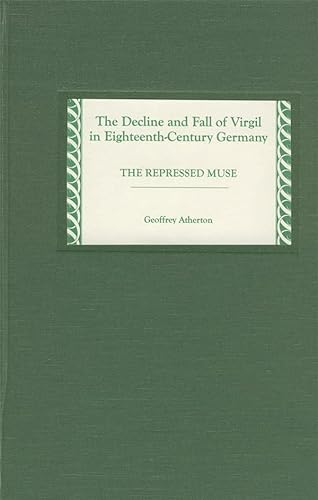The Decline and Fall of Virgil in Eighteenth-Century Germany: The Repressed Muse: 1 (Studies in German Literature Linguistics and Culture) - Hardcover

Zu dieser ISBN ist aktuell kein Angebot verfügbar.
Alle Exemplare der Ausgabe mit dieser ISBN anzeigen:Atherton argues convincingly that Virgil's work exerted a continued, albeit unacknowledged creative influence on epic and pastoral literature by German authors of the period.... This book makes a significant contribution to scholarship on the reception of ancient literature in Germany. CHOICE
Since the 18th century Virgil's fortunes have again begun to rise ... in part because of the establishment of Virgilian studies that looked at the elements of Virgil's poetry on its own terms rather than as an imitation of Homer. Symbolic of these changes, Atherton concludes by pointing to the sympathetic portrayal of Anchises and Aeneas in Christa Wolf's novel Cassandra.... Virgil remains very much alive. GOETHE YEARBOOK
This is a remarkable book; vast learning is evident on every page, yet the writing is crisp, lucid, sometimes witty.... In its tracing of "a perceptible, though attenuated, Virgilian strand" in the pastoral world of the German idyll, this book will surely establish itself as a significant work of scholarship. JOURNAL OF EUROPEAN STUDIES
Geoffrey Atherton is Assistant Professor in the Department of German Studies at Connecticut College.
„Über diesen Titel“ kann sich auf eine andere Ausgabe dieses Titels beziehen.
- VerlagCamden House Inc
- Erscheinungsdatum2006
- ISBN 10 1571133062
- ISBN 13 9781571133069
- EinbandTapa dura
- Anzahl der Seiten332
Gebraucht kaufen
Zustand: Wie neuStill in the shrink-wrapping. List... Mehr zu diesem Angebot erfahren
Versand:
EUR 4,55
Von Kanada nach USA
Beste Suchergebnisse beim ZVAB
The Decline and Fall of Virgil in Eighteenth-Century Germany : The Repressed Muse
Buchbeschreibung Hardcover. Zustand: As New. No Jacket. 3rd Edition. Still in the shrink-wrapping. List price Amazon - $70.00. "In the early modern period, the culture of Rome, with Virgil as its greatest figure, was the model for emulation. The age of Louis XIV compared itself to the Augustan age, and Dryden hailed Virgil as "my Divine Master." But in 18th-century Europe, a general shift occurred in favor of Greece, a trend that was most pronounced in Germany. Winckelmann, the spokesman for philhellenism, extolled Greek art and dismissed all Roman art as derivative and Virgil as second rate and incapable of understanding true beauty. Yet he nonetheless remained indebted to Virgil for his view of Greek art, although he failed to recognize it.The export of Winckelmann's new view of Virgil and more generally Roman culture - shared to varying extents by Lessing, Herder, Goethe, and the brothers Schlegel - to the rest of Europe in the 19th century, particularly to the English-speaking world via Coleridge and Matthew Arnold) soon made it the reigning dogma: indeed it formed the point of departure for Virgil scholarship in the 20th century. This, however, did not prevent German poets from using Virgil, although neither they nor later scholars called attention to it. Virgil became a repressed muse, and has a continued, unexamined presence in the epic and idyll of Klopstock, Wieland, Goethe, and Novalis. Geoffrey Atherton's comparative investigation of the relation of modernity to antiquity through Virgil and his twofold reception represents a new perspective on this issue" (Publisher). Artikel-Nr. HB2943
Weitere Informationen zu diesem Verkäufer | Verkäufer kontaktieren
The Decline and Fall of Virgil in Eighteenth-Century Germany. The Repressed Muse. / Studies in German Literature, Linguistics, & Culture.
Buchbeschreibung Zustand: Gut. 312 p. From the library of Prof. Wolfgang Haase, long-time editor of ANRW and the International Journal of the Classical Tradition (IJCT). - A very good and clean copy. - At the beginning of the eighteenth century Virgil enjoyed a position of unparalled authority in the literary culture of Germany as well as Europe more generally. Virgil's preeminence in the highest of the recognized genres of poetic composition, the epic, was unquestioned, and in the popular and luxuriant pastoral, his language, his motifs, and his image of Arcadia (his own innovation) pervaded the artistic consciousness of the age. Yet by the century's close Virgil had been not merely dethroned but also degraded as the poet who had failed to compose anything that could creditably be called a poem. This fall from grace was not confined to Virgil alone but extended to the assessment of the entire Roman literary achievement: Virgil became the failed poet, and Latin literature the failed national literature. To explain this shift requires an examination of its relation to the wider concerns of the German Enlightenment and the contemporaneous rise of German philhellenism. The primary aim of this book is to explain this repudiation of Virgil and the Latins in Germany during the eighteenth century and the understanding of antiquity it bequeathed to the nineteenth and twentieth centuries. The book's other objective is to show that, despite Virgil's official dethronement and dismemberment, German writers of the period in epic and pastoral literature continued to harken to the Virgilian muse, although they were increasingly disinclined to acknowledge it after the century's midpoint. ISBN 9781571133069 Sprache: Englisch Gewicht in Gramm: 788 16,3 x 2,3 x 23,7 cm, Original cloth. Artikel-Nr. 1164282
Weitere Informationen zu diesem Verkäufer | Verkäufer kontaktieren

